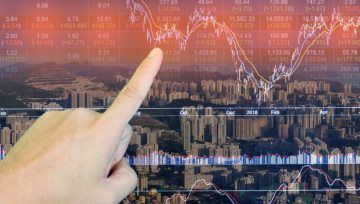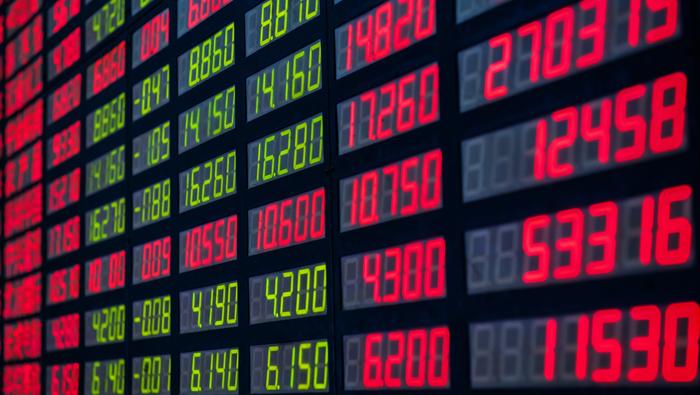Knowing how to control emotions while trading can prove to be the difference between success and failure. Your mental state has a significant impact on the decisions you make, particularly if you are new to trading, and keeping a calm demeanor is important for consistent trading. In this piece, we explore the importance of day trading psychology, for both beginner and more experienced traders, and give some pointers on how to trade without emotions.
The Importance of Controlling Emotions While Trading
The importance of day trading emotional control cannot be overstated.
Imagine you’ve just taken a trade ahead of Non-Farm Payrolls (NFP) with the expectation that if the reported number is higher than forecasts, you will see the price of EUR/USD increase quickly, enabling you to make a hefty short-term profit.
NFP comes, and just as you had hoped, the number beats forecasts. But for some reason, price goes down!
You think back to all the analysis you had done, all the reasons that EUR/USD should be going up – and the more you think, the further price falls.
As you see the red stacking up on your losing position, emotions begin to take over – this is the ‘Fight or Flight’ instinct.This impulse can often prevent us from accomplishing our goals and, for traders, this issue can be very problematic, leading to knee-jerk reactions.
Professional traders don’t want to take the chance that a rash decision will damage their account – they want to make sure that one knee-jerk reaction doesn’t ruin their entire career. It can take a lot of practice, and many trades, to learn how to minimize emotional trading.



The 3 Most Common Emotions Traders Experience
Some of the most common emotions traders experience include fear, nervousness, conviction, excitement, greed and overconfidence.
Fear/Nervousness
A common cause of fear is trading too big. Trading with improper size magnifies volatility unnecessarily and causes you to makemistakes you normally wouldn’t make if you weren’t under the stress of risking larger losses than normal.
Another culprit for fear (or nervousness) is you are in the ‘wrong’ trade, meaning one that doesn’t fit your trading plan.
Conviction/Excitement
Conviction and excitement are key emotions you’ll want to feed off, and you should feel these in every trade you enter. Conviction is the final piece of any good trade, and if you don’t have a level of excitement or conviction then there is a good chance you are not in the ‘right’ trade for you.
By ‘right’ we mean the correct trade according to your trading plan. Good trades can be losers just as bad trades can be winners. The idea is to keep yourself winning and losing on only good trades. Making sure you have conviction on a trade will help ensure this.
Greed/Overconfidence
If you find yourself only wanting to take trades that you deem as possible big winners, you could be getting greedy. Your greed may have been the result of doing well, but if you aren’t careful you may slip and end up in a drawdown.
Always check that you are using proper trade mechanics (i.e. sticking to stops, targets, good risk/management, good trade set-ups). Sloppy trading as a result of overconfidence can end a strong run.
Learn more about managing greed and fear while trading.
DailyFX Analyst Nick Cawley on Losing Discipline

Nick Cawley has more than 20 years’ experience in the markets and trades a variety of fixed-income products.
"My worst trades - and there have been a few of them - have all been when my best laid plans are thrown out of the window when I lose discipline.
‘I didn’t use correct set-ups and stops; I thought I was ’better’ than the market; I doubled up when I was losing and lost more, and I put more money into my trading account to chase my losses.
‘I lost control of my emotions and traded when I should have looked without any emotion at my position and cut them and moved on. Easy to say, difficult to do, but a must for any trader who is looking for long-term success."
How to Control Emotions While Trading: Top Tips and Strategies
Planning out your approach is key if you want to keep negative emotions out of your trading. The old adage ‘Failing to plan is planning to fail,’ can really hold true in financial markets.
As traders, there isn’t just one way of being profitable. There are many strategies and approaches that can help traders accomplish their goals. But whatever is going to work for that person is often going to be a defined and systematic approach; rather than one based on ‘hunches.’
Here are five ways to feel more in control of your emotions while trading.
1. Create Personal Rules
Setting your own rules to follow when you trade can help you control your emotions. Your rules might include setting risk/reward tolerance levels for entering and exiting trades, through profit targets and/or stop losses.
2. Trade the Right Market Conditions
Staying away from market conditions which aren’t ideal is also prudent. Not trading when you aren’t ‘feeling it’ is a good idea. Don’t look to the market to make you feel better; if you aren’t up to trading the simple solution may just be to step away.
3. Lower Your Trade Size
One of the easiest ways to decrease the emotional effect of your trades is to lower your trade size.
Here’s an example. Imagine a trader opens an account with $10,000. Our trader first places a trade for a $10,000 lot on EUR/USD.
As the trade moves at $1 a pip, the trader sees moderate fluctuations in the account. An amount of $320 was put up for margin, and our trader watches their usable margin of $9,680 fluctuate by $1 per pip.
Now imagine that same trader places a trade for $300,000 in the same currency pair.
Now our trader has to put up $9,600 for margin – leaving them with only $400 in usable margin – and now the trade is moving at $30 per pip.
After the trade moves against our trader only 14 pips, the usable margin is exhausted, and the trade is closed automatically as a margin call.
The trader is forced to take a loss; they don’t even have the chance of seeing price come back and pull the trade into profitable territory.
In this case, the new trader has simply put themselves in a position in which the odds of success were simply not in their favor. Lowering the leverage can greatly help diminish the risk of such events happening in the future.
4. Establish a Trading Plan and Trading Journal
In terms of fundamental factors, planning for various outcomes in the runup to key news events may also be a strategy to bear in mind.
The results between new traders using a trading plan, and those who don’t can be substantial. Compiling a trading plan is the first step to attack the emotions of trading, but unfortunately the trading plan will not completely obviate the effects of these emotions. Keeping forex trading journals may also be helpful.
5. Relax!
If you're relaxed and enjoy your trading, you will be better equipped to respond rationally in all market conditions.
Further Resources to Manage Emotions and Support Your Trading
For more information on managing your emotions when trading, check out our free trading guide Traits of Successful Traders, with exclusive insights from DailyFX analysts. Also on the subject, the following articles may be helpful





